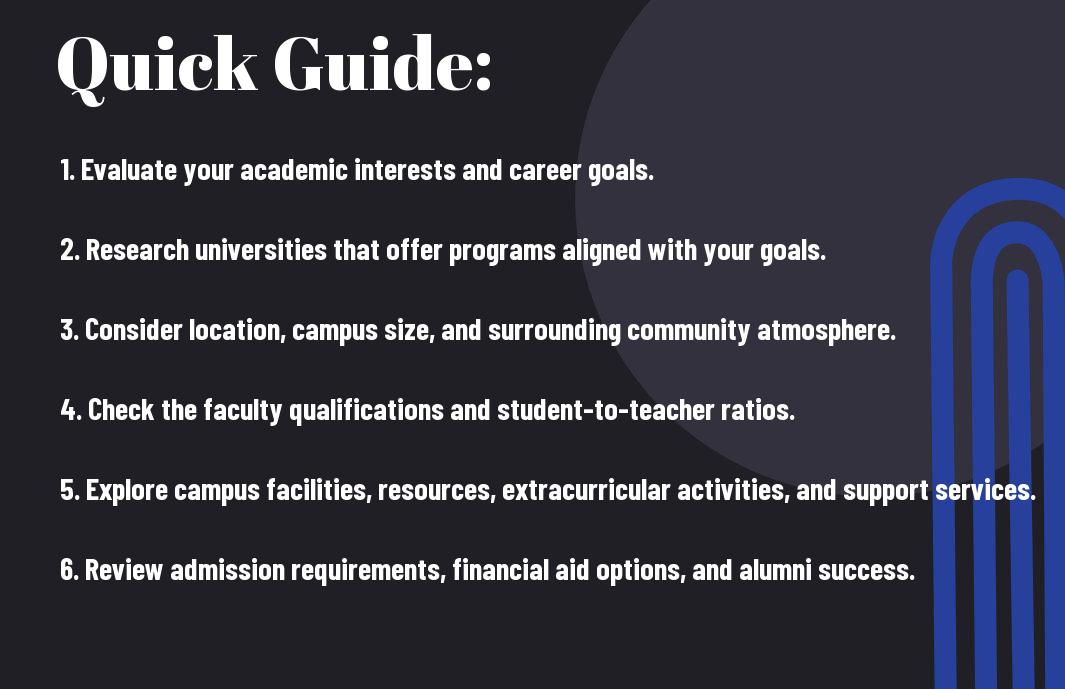Guide #Ultimate to navigating the tumultuous waters of higher education! The decision of which university to attend is one of the most critical you’ll make in your lifetime, impacting your future opportunities and experiences. It’s crucial to consider factors such as program quality, location, cost, campus culture, and career prospects before making your choice. Let’s dive deep into the decision-making process to ensure you find the perfect fit for your academic and personal growth. Let’s get to it!
Key Takeaways:
- Know Your Priorities: Determine what factors are most important to you in a university such as location, campus size, academic programs, extracurricular activities, and overall culture.
- Research Thoroughly: Take the time to research and visit potential universities to get a better understanding of the campus environment, faculty, student life, and opportunities available.
- Trust Your Gut Feeling: Ultimately, go with your instincts and choose a university where you feel comfortable, supported, and excited to pursue your academic and personal goals.

Understanding Different Types of Universities
Little did you know, there are various types of universities out there that cater to different needs and goals. By understanding the differences between these institutions, you can make an informed decision that aligns with your aspirations and preferences.
Knowing the types of universities available can help you narrow down your options and find the best fit for your academic journey.
| Public Universities | Private Universities |
| Liberal Arts Colleges | Technical Institutes |
| Research Universities | Community Colleges |
Public vs. Private: The Fundamentals
For many students, the choice between a public and private university comes down to cost and campus environment. Public universities typically receive funding from the state and are larger in size, offering a wide range of programs and resources. On the other hand, private universities are often more expensive but can provide smaller class sizes and a more personalized education experience.
Liberal Arts, Technical Institutes, and Research Universities: Pros and Cons
Fundamentals: When deciding between liberal arts colleges, technical institutes, and research universities, it’s important to consider the pros and cons of each. While liberal arts colleges focus on a well-rounded education and critical thinking skills, technical institutes specialize in practical skills and hands-on training. Research universities offer opportunities for cutting-edge research but may have larger class sizes and less individualized attention.
| Liberal Arts Colleges | Technical Institutes |
| Pros: Small class sizes, emphasis on critical thinking Cons: Limited career-specific programs | Pros: Hands-on training, specialized programs Cons: Less focus on liberal arts education |
| Research Universities | |
| Pros: Cutting-edge research opportunities, diverse academic programs Cons: Less personalized attention |
Community Colleges and Vocational Schools: Are They Right for You?
With the rising costs of higher education, community colleges and vocational schools have become popular options for students seeking more affordable and practical training. If you are looking to quickly gain skills for a specific job or transfer to a four-year university, these institutions could be the right choice for you.
If community colleges and vocational schools appeal to you, remember that they offer lower tuition costs, flexible scheduling options, and hands-on training in various fields. While they may not offer the traditional campus experience of a four-year university, they can provide a valuable education that aligns with your career goals.

Crucial Factors to Consider
- Location, Location, Location: Not all universities are created equal, and one of the biggest factors to consider is the location of the campus. It’s imperative to think about proximity to home, weather, and local amenities when making this decision. Keep in mind, you’ll be spending the next few years of your life in this new environment, so choose wisely.
- Programs and Degrees: Finding Your Perfect Academic Fit
- Campus Culture: Fitting In and Standing Out
- Financial Aspects: Tuition, Scholarships, and ROI
Location, Location, Location: How to Weigh Its Importance
For many students, the location of a university can make or break their experience. The opportunities for internships, networking events, and cultural experiences that come with being in a specific city can greatly enhance your education and overall growth as a person.
Programs and Degrees: Finding Your Perfect Academic Fit
Choosing the right program or degree that aligns with your interests and career goals is crucial. Consider factors such as faculty expertise, research opportunities, and industry connections when evaluating different academic programs. Any decision you make should be in line with your passion and future aspirations.
The Step-by-Step Process to Narrow Down Your Choices
| Brainstorming Your Priorities | Research Tips |
| Self-Reflective Checklist | Tools and Tactics to Dig Deeper |
Checklist: Brainstorming Your Priorities
Checklist your priorities is key before submerging into university research. Ask yourself questions like ‘What majors am I interested in?’, ‘Do I want to be close to home or explore a new city?’, ‘What kind of campus environment do I thrive in?’. This checklist will serve as your compass in the decision-making process.
Research Tips: Tools and Tactics to Dig Deeper
- Utilize university websites for detailed information
- Reach out to current students or alumni for insider perspectives
- Attend college fairs and information sessions for face-to-face interactions
Researching universities goes beyond their websites. Dive deep by connecting with current students, attending events, and reaching out to alumni. Recognizing campus culture and support services is crucial in finding the right fit.
Campus Visits and Virtual Tours: A Real Feel of University Life
An important part of the decision-making process is experiencing campus life firsthand. Whether through physical visits or virtual tours, immerse yourself in the atmosphere. Feel the vibes, see the facilities, and envision yourself thriving in that environment.
Narrow down your choices by physically visiting campuses or taking virtual tours to experience the life you might lead there. Pay attention to details such as classroom sizes, campus facilities, and overall atmosphere. These experiences will give you a real sense of whether a university is the right fit for you. Do not forget, the decision is not just about the academics but also about the student experience.
Making The Decision: Pros and Cons
| Pros | Cons |
| Location | Tuition cost |
| Program reputation | Distance from home |
| Campus facilities | Class size |
| Job placement rate | Weather |
| Extracurricular activities | Quality of professors |
Decision Time: Balancing Heart and Mind
Balancing your heart’s desires with your mind’s practicality is crucial when choosing the right university. Consider your personal interests and passions, but also weigh the long-term benefits of your decision. Finding the perfect balance will lead you to a fulfilling and successful university experience.
Handling Rejections and Acceptances: Keeping Your Cool
Little setbacks like rejection letters or multiple acceptances can be overwhelming, but it’s imperative to keep your cool during this time. Remember that everything happens for a reason, and each outcome is an opportunity to learn and grow. Stay positive and trust that the right path will unfold for you.
As you navigate through the highs and lows of the college application process, it’s important to focus on your goals and aspirations. Don’t let rejections discourage you, and don’t let acceptances distract you from your ultimate mission. Stay true to yourself, stay focused, and keep moving forward with determination.
Conclusion
With these considerations in mind, choosing the right university for you becomes a strategic decision that can shape your future success. Remember to prioritize your goals, values, and personal preferences when evaluating your options. For more tips on finding the perfect fit for your higher education journey, check out The Ultimate Guide to Choosing the Right College. It’s not just about where you end up, but how you thrive and grow once you’re there!
FAQ
Q: Why is choosing the right university important?
A: Choosing the right university is crucial because it can shape your future career, network, and overall educational experience.
Q: What factors should I consider when choosing a university?
A: Consider factors like location, academic programs, campus culture, financial aid options, and opportunities for internships and job placements.
Q: How can I determine if a university is the right fit for me?
A: Visit the campus, talk to current students and alumni, attend information sessions, and do thorough research on the university’s reputation and values.
Q: Should I choose a university based on rankings?
A: Rankings can be a helpful factor to consider, but they should not be the sole determining factor. It’s important to choose a university that aligns with your personal and academic goals.
Q: How can I make the most out of my university experience?
A: Get involved in campus activities, join clubs and organizations, build relationships with professors and peers, and take advantage of internships and study abroad opportunities.
Q: What resources are available to help me choose the right university?
A: Utilize resources such as college websites, guidance counselors, college fairs, online forums, and social media platforms to gather information and insights about different universities.
Q: What should I do if I’m still unsure about which university to choose?
A: Consider creating a pros and cons list for each university, seek advice from mentors or academic advisors, and trust your instincts to make the best decision for your future.





